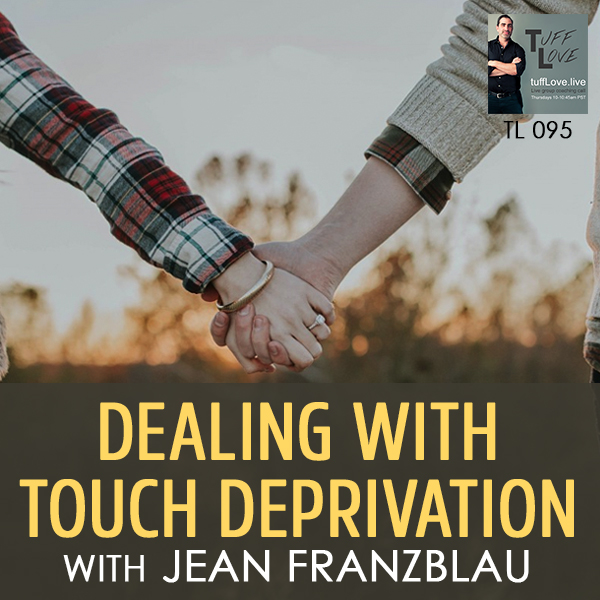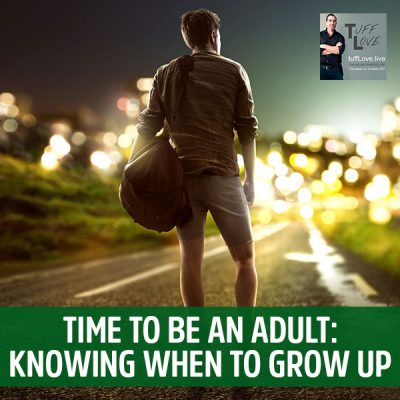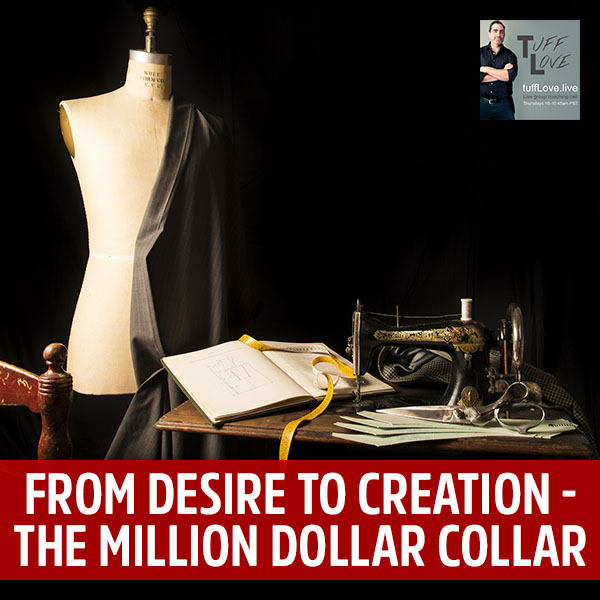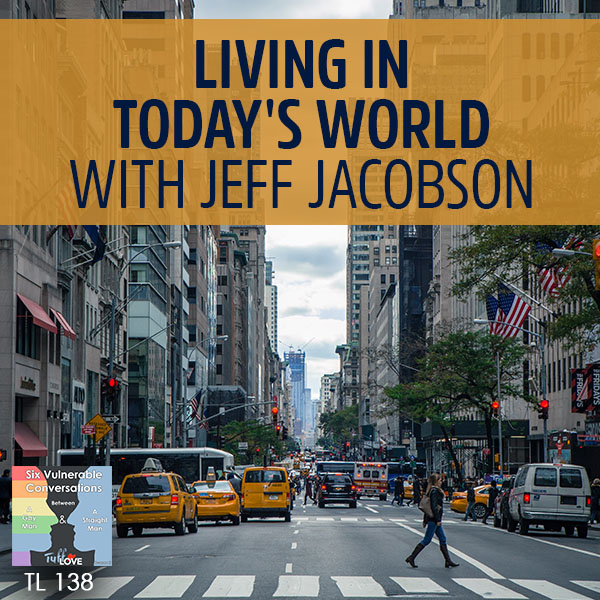
095: Dealing with Touch Deprivation with Jean Franzblau
Oct 31, 2017
We are hard-wired for connection. Chemicals are released the moment our body touches another. This chemical not only makes us feel good, it makes us crave connection. But as we evolved as humans, we also developed this wall called personal space. To bring down this wall, Jean Franzblau created Cuddle Sanctuary where strangers are comfortable enough with each other that they can hold hands and cuddle and through this make connections that will make them feel good about themselves. Learn why this is a charged topic especially for men who are touch-deprived in the American culture.
—
I’m here with Jean Franzblau, Director and Creator of Cuddle Sanctuary based in Los Angeles about the concept of deliberate touch and how we need it and how we don’t ask for it. We’ve dived into subjects around touch, around masculinity, femininity, homophobia, things like consent. She talks about her work with a college campus and this very charged concept of touch and how we need it and want it and aren’t having enough. We then bring two guests on the line. We talked about a woman’s experience of her consent being violated by another woman, and how to speak up and be with that. Also Mark comes on the line and talks about how he gets filled up, and Jean has some great ideas about that.
095: Dealing with Touch Deprivation with Jean Franzblau
I’m very excited to be here with my good friend, Jean, who I have known probably about four years, five years at this point crossing over in workshops. I did some of her workshops and then I helped her with her business. Just truly an amazing human being talking about the concept of the Cuddle Sanctuary and cuddling, which is so much fun and yet so interesting to bring into the public domain. I’m really excited to bring her on the show and to talk to her about cuddling and how she made it into a business and just her approach to all of it. Welcome, Jean, to the show.
Thank you so much. It’s nice to be here to talk about one of my favorite subjects.
Once upon a time, Jean Franzblau opened an in-flight magazine and saw bunch of people chilling out and cuddling. As a single and sometimes lonely professional, she thought to herself, “That’s for me.” Amazed by the wellness and happiness benefits she experienced, Jean founded Cuddle Sanctuary, the Los Angeles destination for consent and hug-positive events and professional cuddling since 2014. She’s also expanded the reach of Cuddle Sanctuary by teaching consent on college campuses. She graduated cum laude with BA in Communications from UCLA, and has appeared in BuzzFeed, TLC, ComedyCentral, and the veritable Rolling Stone. Welcome to the show. We’ll be talking and then we’ll have one or two people come on that we’ll coach and give some advice to. Let’s first talk about you. Cuddle Sanctuary, you’re a professional cuddler. Tell people what that means and what you do?
I put on events where a group of strangers can come together and feel comfortable enough to connect, to talk, and to possibly hold hands, hug and even cuddle. I also work one-on-one with clients. Some clients would never go to an event, they only would want a privacy of a one-on-one experience and other clients it’s the reverse. They would only go to an event, they don’t care to have a one-on-one experience. We offer both flavors of that at Cuddle Sanctuary.
This is a pretty charged topic because people are very nervous about personal space, especially in the US. I think it’s different in different countries. In the US we have a significant connection to what’s been called our circle of fear, the personal space that we have around us. You’re providing a space for people to overtly and with consent learn how to have other people, non-intimates, strangers even, invade that circle of fear. How do you do that? How do you manage that?
First of all, I take advantage of biological necessity for connection. We’re hard-wired for connection. In fact, our bodies release yummy chemicals that make us feel good when we get physical touch and so there’s a craving within us. Sometimes it’s hard to pinpoint what it is because in our culture we don’t really have words for it like, “I need a hug,” is much more difficult to tease out than, “I need lunch. I’m really hungry.” The need is there and that’s one of the things that benefits me hugely when I put on these events or when I work one-on-one with a client.

Cuddle Sanctuary: People know what the boundaries are, what’s okay and not okay in this space.
What matters most in creating an environment where people can actually close the distance between each other safely is creating what we call a safe container. That people know what the boundaries are, what’s okay and then what’s not okay in this space. The very first 45 minutes of every event we have, we’re talking about consent while we’re playing games to get to know each other and to break the ice, and all the ways that you might have experienced in other workshops. We’re also talking about what kind of touch is okay, what’s the right vibe for this space, how can we know the etiquette of this unique space, and we teach that and talk about it very overtly.
Let’s talk about that biological need. I’ve had the good fortune to always having the option for touch from relatives or friends. My friends were touchy feely and I’ve had girlfriends in the past. For people who don’t have access for one reason or the other, what is this biological need and why is there a biological need for touch?
I think that it was the way in which the human species was able to survive. I believe in evolution. We evolved in such a way that people that came together and cooperated survived, and people that didn’t didn’t. Coming together creates the biological sense of pleasure, that oxytocin. Maybe I should introduce that for those people who aren’t super familiar with it. Oxytocin is a peptide hormone found in mammals like you and I, like cats and cows and dogs and other mammals. It gets released in the body from the brain when we receive safe consensual touch. It gets released in the body when a mother breastfeeds. It gets released in the body when people make love. It gets released in the body when you receive a hug, not a quick hug but a hug that you can really sink into, or simply holding hands and being side by side with somebody. There’s physical connection where you can relax for a while. Some studies say twenty seconds. The feeling that you get so that you recognize it is it’s a feeling of feeling relaxed, it’s a feeling of trust, it’s a bonding hormone, and I feel an experience of wellness and connection.
My first event that I ever attended, I went to sleep and I slept as deeper than I can remember sleeping since I was a child. I woke up feeling connected and happy. I didn’t realize that I was tripping out on oxytocin. Oxytocin has all of those benefits. Not only the mental and wellness benefits of that feel-good feeling, but also it helps you sleep along with improving heart health and boosting the immune system and lowering cortisol levels, which is the stress hormone. What a package of good health. For people who want a health hack, to me this is the one. If you’re not getting enough hugs, you can actually boost your health by getting more.
It’s funny you said twenty seconds because I was thinking about the bro hug. The bro hug which I think is like the minimal amount of time and the patting, it’s just like that shiatsu massage patting, shortest time possible with as little physical body touch as possible, which is not quite the oxytocin thing you’re looking for.
It’s not. I know the difference because I’ve been studying this in my own body. I’ve seen hundreds of people come through our doors. I know the feeling that click when I’m like, “Now I’m better.” I feel it. It’s a wonderful wellness practice. I call it ODO, Optimum Daily Oxytocin. I plan on it every day like, “Where am I going to get my connection?”
If you’re not getting enough hugs, you can actually boost your health by getting more. Click To TweetI want to segue way to off the topic but it’s important. Especially men are so touch-avoidant. Do you have any viewpoints of why do you think people avoid touch in general?
For the first one, it’s not just that men are touch-avoidant. Men are touch-starved in our culture. Men have less people that they’re allowed to touch in terms of what the cultural norms are than women do. I would call it touch-starved. Why? Part of it has to do with that they’re not able to connect and there’s a fear of connecting. One reason is because of homophobia. The idea that if I touch and enjoy that touch that it makes me gay. It’s a little bit sloppy and very broad but I’m trying to just get to the point. Boys in elementary school, boys on the playground used to grab each other and rough-house and hold hands and love each other as brothers, as friends. That disappears at a certain age, and it’s the age in where one becomes aware of, “What does masculine mean in our culture?” One means stoic. It means, “I’m an island.” It means, “I don’t need to connect.” I think it’s to the detriment of men and women that there is this divide. I think part of it is that very thing. What do you think about that supposition?
The Simon & Garfunkel song which is, “I am a rock, I am an island.” It was a tell-tale song for me when I was growing up because there was this, “I can roam the planes alone. I am a solid man. I do not need anything. I am solo free.” I think a lot of that is prided on male culture.
In World War II, there are some beautiful photos about during that era at men who were with their troops, with their buddies would hold hands. If you look at the photos, there’s a whole website dedicated to these photos. Guys are sitting on each other’s laps, they were holding hands, and it’s not homo-erotica. It’s just how men used to be. They used to be much more connected with each other physically, and then something changed.
I’d like to research that because I think that’s an important piece. I could just see it. I can see maybe something happened in the ‘50s and the ‘60s and the ‘70s that definitely created that divide.
When I look at those photos, my heart breaks. I’m like, “Look at the men. They used to get along.” I’m not saying men don’t get along but that stoicness, that island, has become the norm and has become something to be achieved. Can you imagine to achieve disconnection, to achieve hurting your own body by the lack of touch. Of course, it’s important also to mention the deep distrust of male sexuality in our culture. To be aroused, to have erotic feelings as a man is to be a potential threat because of rape culture. Therefore, good men are trying the best they can to separate themselves from the danger that they might provide. It’s a little sloppy and I hope you’ll fix this up for me. If you’re a good man and you’re worrying about that, then you’re going to keep yourself distant because arousal is strong. Therefore, don’t touch and then you won’t have to deal with that.
It’s not sloppy. It’s what we call generality. Of course, there are extremes on different ends. I do think what you’re saying is totally true. Let’s pull in the current events of #MeToo and this rise of awareness around sexual harassment and a lot of conversation, incredible amount of conversation going on around. I don’t want to diminish #MeToo and the effect it’s had on women, but let’s talk about the effect, the rise of this has brought onto men and to your point of men being scared of their own sexuality. Do you have any views around that piece?

Cuddle Sanctuary: We have to be aware of arousal because it can happen and we approach it with respect.
Yes. Given that I’m a cuddle professional and we’re a platonic service, I think it’s important to make a comment that I am a sex-positive human being and Cuddle Sanctuary paradoxically is a sex positive company. We honor and respect your sexuality. It’s not exactly what we’re stoking at our events, but we have to be aware of arousal because it can happen and we approach it with respect. In terms of how #MeToo impacts good men out there, I think it can be confusing because it’s like, “Did I take advantage of my privilege and not even know it somewhere in my past?” This is a stretch I think but I’ll just speak for myself. If we’re talking about feeling of like, “There’s something inside me that might be bad.” I don’t know if it’s from early childhood, it’s just something like, “The people really know who I am.” I think when you get these messages on Facebook and throughout the culture that are saying you probably committed a crime, you probably are a rapist and don’t even know it because you were five, because of something you did that one time. I think it can create a lot of stress and anxiety.
It breaks my heart because as a man, I’ll speak for myself, I had a big appetite, I have big desire, I like it. I like my appetite. When I first started doing conscious sexuality work, I felt that same fear and that same shame. Just that total belief, the inherent baseline belief, that I’m doing something wrong just by me being alive; because I’m breathing, I’m doing it wrong. I had to dial back all my actions and all my thoughts and then slowly get more in connection with them, which I think was great because it created more consent conscious behaviors. I do remember that time, the intense time of shame.
Thank you so much for saying and I love your vulnerability. I think that the challenge here is that if I have a big sexuality and I do and so many of us do, I’ll pretend I’m the masculine right now and let’s say I’m a white guy. I’ve been born in privilege without even knowing it. It’s really possible as good as I know myself to be that I have made mistakes in my past that have hurt without even knowing it because of the privilege. Not only is it the shame that you’re talking about that needs to be addressed and healed, but also truly mistakes have happened by accident. The awareness is important, it’s crucial, but I feel like we need to love ourselves while we learn. That’s a hard thing to do. “I need to love myself even though I make mistakes. I need to love myself even though I’m still fumbling through this thing about consent.”
Let’s flip to the other side of the equation. Why do you think women are touch-avoidant in today’s society?
It begins with slut shaming. If I like sensuality, if I enjoy even like I’m eating something and I’m like, “Mmm.” Is that really appropriate for you to find something so delicious like that in public? Who are you? What are you about? The judgment of the sensual and the slut shaming of a woman in her full selfhood. If that’s the case that slut shaming happens, and it certainly started happening for me in my elementary years, that means I better keep it under wraps. It seems like I’m only talking about sexuality but I’m also talking about the desire for sensuality. If you keep it under wraps for long enough, if you label it as bad or shameful because a culture tells you to, after a while one is going to lose touch with it and lose even the sense that there’s a need there.
We need to love ourselves while we learn. Click To TweetI think I’ll speak for myself as the feminine, that the feminine equipment, mental, physical, emotional, spiritual, is complicated. All you need is a look of disapproval and the feminine can shut down. I’ll speak for myself, I’m delicate that way, that the only way I can blossom is in full and utter approval. I found those circles of approval with the lovers I select and the friends I select but the culture is screaming at me something else. To be a sensual being, to enjoy what’s delicious in touch, in taste, in smell, etc. is a revolutionary act for the feminine. I love that we’re talking about it especially around touch.
Let’s do one more topic before we bring in our guest on the show. I love that you teach consent to college campuses. Maybe that’s really a great topic of on a college campus you’re talking about consent. What are some things you’ve noticed, what are the things you’ve learned, maybe some things that surprised you about young people and consent?

Cuddle Sanctuary: To be a sensual being, to enjoy what’s delicious in touch, taste, smell, is a revolutionary act for the feminine.
I should mention that I’ve taught Sex Ed to colleges and I’m transitioning now. Apparently there’s a potential gig in Seattle next year. The reason I’m telling you that is that Cuddle Sanctuary apparently is frightening to college campuses because I don’t say, “I will teach you consent and you will know you are bad, and you will know when are good.” It’s more on like, “Let me talk to you about how to get positive touch that feels yummy and delicious.” That is frightening shit for the campuses because I’m not saying, “Just say no,” and I’m not saying, “Abstinence.” I’m saying, “Let me teach you how to make this delicious for both parties.” They think that’s frightening.
I can totally see that and it’s totally frightening. How can the words Cuddle Sanctuary be scary? They’re like Care Bears and big puffy dragons and stuff. You taught Sex Ed to colleges. What are you noticing there? What’s going on with the young people?
The first thing I noticed is that when I’m on campus, I’ve had people come into my course and go, “What is this about?” I would call my class The Real Sex Ed because I’m like, “I’m going to tell you the real shit about consent and sex positive and stuff like that.” They’re giving me the side eye or what have you because they’re not sure if they’re going to be suckered into a lecture that’s going to shame them about their sex. There are organizations on campuses with really sexy marketing that are basically bait and switching people to come to their events to teach them morality lessons about sex. I was surprised I’m like, “I call it The Real Sex Ed so you know I’m for real.” Apparently better marketing is needed. They’re savvy about the messages that they’re receiving. They are sick and tired of being told, “No and don’t,” and being shamed for the culture in which they’re in, which many people call hook-up culture.
Live Coaching
Let’s bring our new friend on the line, Kristelle.
Hi there.
How are you?
I’m great. Thanks.
Thanks for coming on the show.
Thanks for having me. This is such a great combination of topics of the need and want and desire for touch and the whole #MeToo clear boundaries consent. As a sex positive woman in the Bay Area, there’s tons of space for me to receive touch in the acrobatic communities, in the dance community, in the sex positive community. At the same time, I feel myself hardening around boundaries. This #MeToo was really eye-opening for me. I do work with women myself and so I know the stories of what’s happening. I find my own personal reaction to it was this hardening of like, “I need to be more clear of my boundaries, I need to be more tense, I need to be more dominant,” which is not from my perspective going to heal this masculine-feminine challenge that’s going on. I would love some input on how to navigate that skillfully, how to be a woman and be in my feminine and support good men in understanding consent.
For me, it’s really important to, in our funny strange schedule type of world, schedule surrender. In other words, to create points of time where I know I can be in the place of utter surrender. Where are those places in my life where I can shed the defenses, where I know I’m so safe that I can be in an utter state of defenselessness, where I’ll be honored and held and then I can come back to the kingdom, come back to what I would say the goddess part of myself? We do live in an environment that is hostile to the feminine. It’s the truth, but we can create sanctuaries, oases, places where we can create a place of bubble where the feminine is honored. That for me is critical, that on the regular I have those places where I can sink into the soft part of me.
I will say there was a point, and I’m actually considering it of taking a self-defense class, of strengthening my ability to kick ass if I need to. What I’m noticing at my age is that I’m starting to be the protector. There was somebody who worked for me, a woman in her twenties who when she went to do an errand for me, and she would regularly do that errand, there was a man who kept saying things to her and then hugging her, and she felt awkward for a variety of reasons. One is that she was on a job and didn’t want to make waves. I only learned about these months after the fact.
Where I am today, and I can sense in you as well the fierceness, the lioness, the wolf mother, is that I marched right over to that place and I said, “Can we have a talk? Here’s what I observed. Here’s what I’ve heard about what happened between you and my employee. Can we talk about why you did that? Why did you think that was okay?” I walked away and I felt ten feet taller. I’m like, “Who is this woman?” It was womanly. I wasn’t being masculine, I don’t think. It was a womanly empowerment that I was feeling. I guess I’m suggesting maybe that there are two directions we can go. One is to find our surrender, but the other also to find the fierceness of the mother or the fierceness of the feminine, which is also part of being a woman. What do you think about that?
We do live in an environment that is hostile to the feminine. Click To TweetI think that’s beautiful, especially finding that safe sanctuary. It’s challenging because I was recently at a woman’s temple where I felt like consent wasn’t practiced. It was really violating for me where I was just like, “I’m in the women’s temple.” I need and want that as well as even among women. We need to learn consent from each other and with each other. The challenge of the fierce feminine is strong in me. I’ve also been shamed for that by men and women and culture. One of my mentors a few years ago, she could sense that I was shaming my power. Feminine power isn’t strong, isn’t dominant, that I was shaming myself and she was like, “Kristelle, what is feminine power?” That for me is being in that healing of allowing space and finding space that I can be supported in the fierce feminine which isn’t passive, which isn’t in the surrender. It’s in the fierce mama bear quality. It’s finding those places that I can be in both, be in the full surrender of the feminine as well as be in the active fierce feminine that take no prisoners.
It makes me think with regards to the fierce feminine is that we need to find our allies. The people in our lives who will say, “You go. I love what you’re doing. It’s a turn on to see you out there being fierce,” and being discerning also about the places that we go to surrender. I’m really saddened to hear that something is labeled and advertised as safe, and you find it not so. A deep discernment around that, speaking up, unfortunately having to speak up in the place that you want to surrender but either way. Speaking your truth as quickly as possible, the same thing I’m sure you coach about. I teach a free webinar about consent for event leaders and for people who lead any events that include touch. It’s free because I want to teach these and model these techniques so that people can apply them across all of the events that they have. If you know anybody who would use that, we post it on our website for free every single month.
I’m just really sad though. It happened to me too. I went to a cuddle event when I was really new at it all and I figured, “Anything that’s called cuddling is going to be sweet and it’s going to be like everything’s going to be great.” Somebody violated my consent. They took my t-shirt and they put it over my shoulder in a way that stretched it because they wanted access to my skin, which I did not give them access for. I said, “Yes, you can give me a massage, but not that you can get all up in my t-shirt and ruin it.” All of a sudden I’m like, “I’m trying to enjoy myself but I don’t feel safe.” Safety is so important for us.
I want to just really mirror that piece about the communication because I think we live in a society of a lack of education and ignorance of your truth. Anytime you educate someone on the effect of their actions, I think there’s a portion of men and a portion of people who will be like, “I don’t care. I’m going to do it anyway.” I actually think the significant majority of people are like, “I had no idea that had such a negative impact.” I’m not sure about that guy with your employee, hopefully he got educated. Without that education, I think it’s a missing piece because we don’t give ourselves permission to speak the truth. Two, we expect that we won’t be received. Then what we do is we continue ignorance and the cycle keeps happening. Your willingness to speak in the moment of a feeling is the greatest gift you can give to someone you want to be intimate with because without it we’re clueless. I think that fierce but connective voice which is necessary.
I love what you said about fierce but connective because what I didn’t say about how I approached that man is I approached him with respect and curiosity. I didn’t let him off the hook but I kept asking him questions. He did not get it. He’s a big tall guy, older than her, the owner of a business, all the different reasons I give him privilege, and he just said, “If she didn’t like it, she should have said something because if she did, I never would have.” He wasn’t saying it in a way that he was appalled in any way. He was just like, “She just did it wrong.” He didn’t get it but I know that he’s going to think twice. I just said, “Maybe ask. Maybe double check. You might be surprised.” Kristelle, more thoughts from you or a different question? Do you feel satisfied?
Telling people who you know will support you, getting the support and love from those who get it is important. Click To TweetOne more question going with that because I do engage in these spaces. I’m in the Bay Area and lots of this is happening, lots of great things are happening. Yet having been shamed so much for being a strong woman that it’s like, “I’m going to be that girl that’s pushing consent,” like in the women’s temple experience where I felt a key component of consent was not done well. How to bring that forward into those spaces with curiosity and respect? In the moment of feeling violated, it can be tricky to do that.
I totally feel you, especially if you want to say it in public, “Wait.” What I want to first say is that, and I’ll speak for myself, when I speak up, it’s important for me to do a lot of things, to give myself a lot of positive self-talk, “Jean, I’m proud of you. Jean, good for you. Jean, thank you for being so powerful. Jean, thanks for speaking up.” Of all of the voices that are going to attack, self-attack along with anything that might come from actual people. It’s like we’re climbing uphill here with a boulder on our shoulders and the boulder is the culture. Not only are we doing the hard thing but also we might be attacked for doing the hard thing. Telling people who you know will support you, getting the support and love from those who get it is important. With regards to speaking in the moment, if I’m triggered, usually it’s not the right moment. If I’m super triggered, if I’m upset, really what I need to do is take care of myself. Usually I don’t approach anything that might be a conflict unless I’m centered, so that feels important. In the moment that you’re thinking of, were you hyper upset? Were you in a space of deep upset?
I was in a freeze response. I was observing it. There was a woman standing in the door of a space I had never been to. I didn’t know her. She walked towards me, giving me a hug. Even if she would have just stood there with her arms open and let me step into her. It was like she was blocking the doorway. My practices are such that I watch it all happen. I let her hug me but I didn’t reciprocate.
Now that I understand the situation, I so love hearing the specifics. One thing for everyone listening, what was just shared about freeze is really important for everyone to know. We’ve all heard of fight or flight, but many people are unaware of freeze. Freeze is, “I say nothing. I do nothing.” It might look like consent because the person’s not saying, “No or I didn’t like that or get off of me,” but instead it’s very, very quiet.
Which is the most common from my own experience and my work with women. It’s the most common response for a woman who is being physically violated. It’s freeze.
I want to offer you a suggestion around because once you said it was about a hug, I’m like, “That’s my department. I can give you some tips on that.” First of all is to practice saying, “I’m not ready for a hug.” If you will do that with me, just hands up, “I’m not ready for a hug.” If you just practice that into the mirror a few times, when it comes up you might just automatically, “I’m not ready for a hug.” It takes a bit of practice ahead of time so that your response would be that. The question is, are you willing to create social awkwardness of “No, thank you,” and “I am?” It took me a long time to get there.
Yeah.
I don’t like that she was blocking the door and saying, “You’ve got to hug me.” What I love is that it sounds like it was a woman that was violating consent, which I think is important for everyone to hear. We all fuck this up sometimes. That woman doesn’t know that her offer of touch is not the most welcoming, wonderful thing. I have people come to Cuddle Sanctuary and go, “I want to be a professional cuddler because I am really huggy.” I’m like, “Actually sometimes being a professional cuddler means being deeply respectful of the boundaries of others around not wanting your touch, around being safe that you’re not going to grab them.” We use what we call the Ask and Wait Method. If it’s useful, please feel free to share that. It’s simply, “If you want to touch me, please ask and then wait for me to answer so I have a chance. That’s going to make me feel so much safer in this environment.”
Thank you.
My pleasure.

Cuddle Sanctuary: With regards to the fierce feminine is that we need to find our allies.
Thank you so much for coming on the show. I really appreciate it. We’re going to bring on Mark for a speed round, Jean.
The place I often find myself is like the bottomless pit of need like, “You can’t touch me enough.” Sometimes that gets wrapped up in my sexuality and I have a hard time discerning, “Do I really need sexual touch or is it just going to be enough to just be held?” There’s that whole conundrum about the American ideal for masculinity about saying, “I need to be held,” and getting caught up in that. “Is that going to make my sexual value less if I speak that way to my partner?” That’s the frame.
First of all, what it sounds like is that your tank is empty. When you say it’s a bottomless pit of need, the truth is actually it’s not. I believe that if you were to have about a solid hour of just being held every single day for a couple of months, you’d actually get full and then you would need less. There’s need there. What I would suggest, if it respects your relationship agreements, to possibly hire a professional cuddler because then it’s not all on your partner. Then again you could also talk to your partner about this, “Is it okay for us to practice non-eroticized touch, simply spooning, holding, and hugging, as a way to see if I can get my health needs met for touch?” It’s getting conflated. Sexuality and platonic touch, it’s hard to even know because you’re so much on empty. It’s just hard to know. My suggestion is to get filled. I spoke about ODO, Optimum Daily Oxytocin. It’s possible that you won’t need a professional cuddler for the rest of your life, but you might need to fill up which means possibly having a good cry with that human being. Who knows what’s going to come up? I can sense from you, you’re very self-aware that you can handle it.
Part of what’s happening is I’m being asked to do it myself. There’s this expectation that there’s a reasonable limit about what I’m capable of meeting in terms of your need, and then therefore I need you to take care of this on your own. Where I get trapped is, “How can I do that by myself?” What you’re talking about is consent around alternative ways of getting that touch.
That could be going to a cuddle event or it could be professional cuddling. These are two great ones. It’s in my wheelhouse so that’s what I think of. Talking about what are those boundaries and how does your partner feel safe knowing that you’re taking care of yourself because when it comes to touch, there are some things you can do all by yourself. You can look into a dog’s eyes and get a boost of oxytocin, but that’s not going to do it for you. You need to really fill up which I think is going to take multiple hours. A good conversation with your partner about what would help them feel safe and what are your commitments that will help the relationship stay intact while you take care of yourself.
I don’t keep shaming myself for my need.
It’s so sad and I’m not surprised the culture is telling you that bullshit. Thank you for knowing what you’re feeling. I encourage you, just as we were talking earlier about self-talk, “I am a human being. I deserve to be nurtured, just as I deserve good food, fresh air, shelter and safety. I deserve to be touched regularly the way my body was built.”
I have my multivitamin now. I have my ODO need. Thank you.
Shame is there as a signal of awareness, but we get stuck in our shame loop. Click To TweetShame is there to me as a signal of awareness, but we get stuck in our shame loop. Then the shame loop actually becomes comfortable and then it is akin to a laziness of staying inside that shame loop because it’s so familiar. Take the shame and be it like as an alert, as like a red alert, a fire alarm, to be aware. The other thing I want to just mention, it’s a new self-discovery just in the last couple of days, is I realized that my hunger for experiences and multiple women and all these things, there’s some level where it comes back to my workaholic nature. It comes back to my inability or lack of experience or lack of practice for my own self-care, not to do with anyone else.
We’ll talk about on the show this balance between a man on a mission and a man’s self-care. I’m really interested if I start to take care of the self-care, massages, walks, getting away from my computer, alone time, or just non-constructive time in the waking hour, how that will affect the rest of my desires. It could be there just might be some simple things for you to shift that might add to. Not to replace what Jean is saying at all, but just to add to a more gratifying package. Man’s Mission versus Self -Care.
I have some curiosity about what it would take to be a cuddler. I really resonated with what you said about Ask and Wait.
First of all, if you’re interested in that whole world, I don’t know if you have ever been to an event, I would recommend that you just begin to immerse yourself in what that world is. One way, you can go to CuddleSanctuary.com. We’ve got free lessons and stuff like that. If you’re based in LA, please come. We have events regularly. If not, thank goodness this movement has been around for over ten years. It was started by Marcia Baczynski and Reid Mihalko who created Cuddle Party. It’s been around which means it might be in your town or city. It might be somewhere nearby so check it out, feel the feelings. If you begin liking those events and if you see a professional cuddler in your city, be a client first. Then if you’re like, “This is life changing. I want to help the world in this way,” the next step would be to get some training which we offer.
Thank you.
Thank you, Mark. Thanks for being on the show. Is there anything else or any free offers or how people could find you?
CuddleSanctuary.com also we’re on social media, Facebook, Twitter, all of it, @CuddleSanctuary along with Instagram. I’m really proud of the blogging that we’re doing. My colleague, Fei Wyatt, and I are blogging every single week around topics that are meaningful around touch, around what the culture is saying about it, what we’re finding as professionals in this industry. Please find us. Free lessons and there’s something called the Cuddle Game which you’ll also find on our site, which is a really fun way to learn consent with a partner and learn how to be safe cuddle buddies with each other.
That’s a downloadable product, the Cuddle Game, right?
It is. Did you know you can be competitive with your cuddling? Now you do. You get points.
Points cuddling, two words not usually going together. Thank you so much for coming on the show. It’s a total blast. Just grateful to know you and grateful for the work you’re doing out in the world.
Thank you so much for letting me talk about this stuff. I loved it.
That’s it, we’ll be back next week. The topic’s going to be Man’s Mission versus Self -Care, which will be an interesting WWF bout. We’ll be talking about that and some of the things I’m learning recently with some pretty intense events in my life. Until then, go forth, speak the truth. Plenty of podcasts, materials and videos you can find at TuffLove.Live. A whole mess of guest interviews is going to be published that you’ll all find on TuffLove.Live/Media. Until then, go forth, get snuggled, get cuddled, be competitive with your cuddling if that’s what turns you on. We’ll see you next week. I love you. Take care.
Thank you so much for joining us for Tuff Love. Thank you Jean, thank you Mark, thank you Kristelle. Thank you everyone. Check out TuffLove.Live for more information. Come join us one week, maybe even come on the show as a coachee. Thank you so much for joining us. We’ll be back next week. Until then, please visit my site at TuffLove.Live. Have a great week. Take care.
Resources mentioned:
About Jean Franzblau
 With her background in both training and the performing arts, Jean Franzblau offers a unique bundle of skills. As a seminar leader, she has presented in nine countries for up to three hundred people. As an instructional designer she has created learning events exploring customer service, communication, stress management and leadership. As a performing artist, Jean has written a solo show and presented it in ten cities. Jean has worked in industries including law, entertainment, technology, non-profit, government, health care, recruiting, hospitality, education, financial services and real estate. She received her B.A. with cum laude honors at UCLA in Communications and Business Administration. She completed the Train the Trainer course with the Association for Talent Development and served on that organization’s Los Angeles board. All of this culminates in her growing Los Angeles enterprise, Cuddle Sanctuary. Cuddle Sanctuary provides experiential workshops and training about consent and the wellness benefits of touch. Jean studied at the renowned Neighborhood Playhouse School of Theater in New York. She has performed in theater, television, voice-over and film.
With her background in both training and the performing arts, Jean Franzblau offers a unique bundle of skills. As a seminar leader, she has presented in nine countries for up to three hundred people. As an instructional designer she has created learning events exploring customer service, communication, stress management and leadership. As a performing artist, Jean has written a solo show and presented it in ten cities. Jean has worked in industries including law, entertainment, technology, non-profit, government, health care, recruiting, hospitality, education, financial services and real estate. She received her B.A. with cum laude honors at UCLA in Communications and Business Administration. She completed the Train the Trainer course with the Association for Talent Development and served on that organization’s Los Angeles board. All of this culminates in her growing Los Angeles enterprise, Cuddle Sanctuary. Cuddle Sanctuary provides experiential workshops and training about consent and the wellness benefits of touch. Jean studied at the renowned Neighborhood Playhouse School of Theater in New York. She has performed in theater, television, voice-over and film.
Podcast: Play in new window | Download







